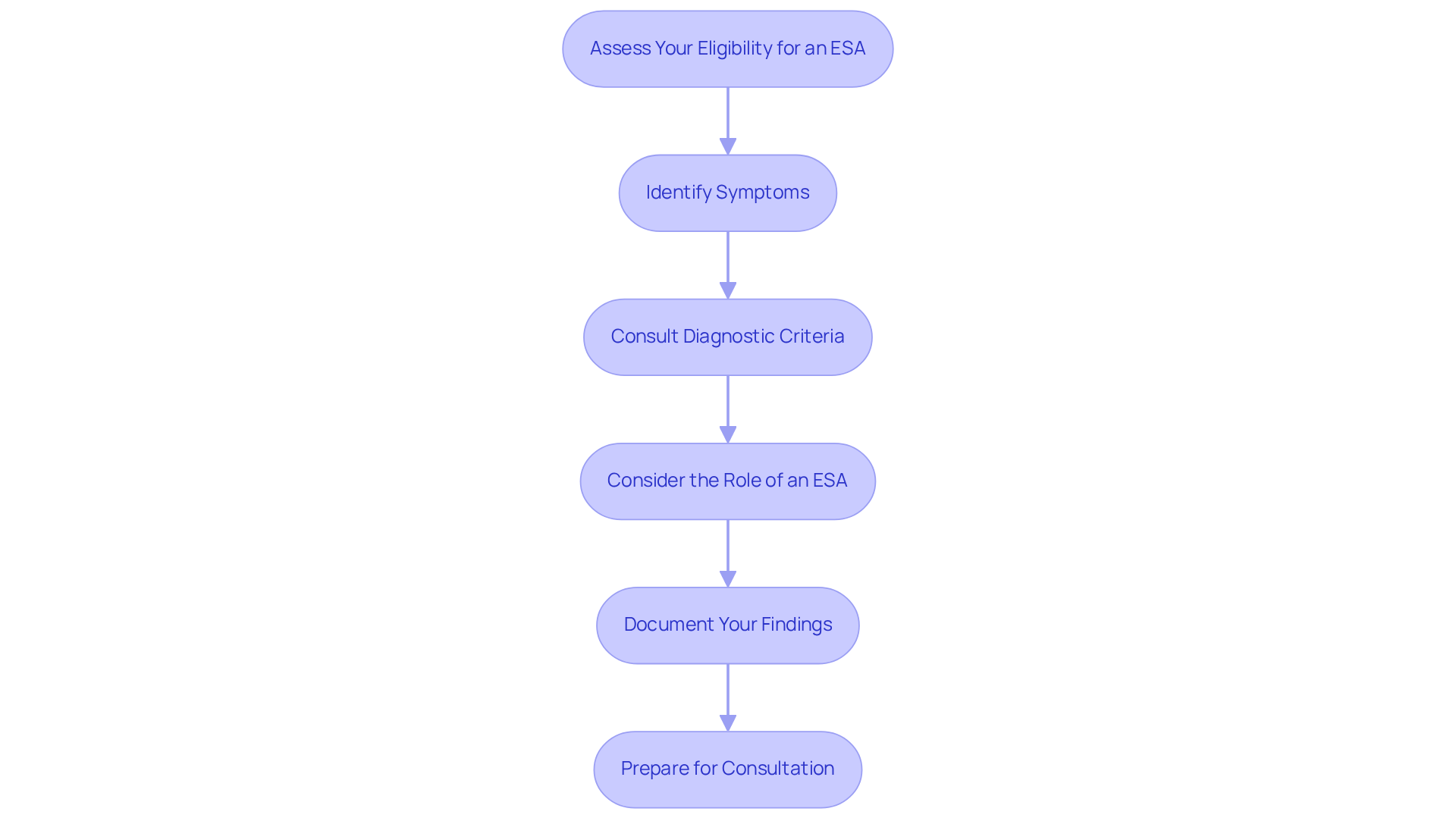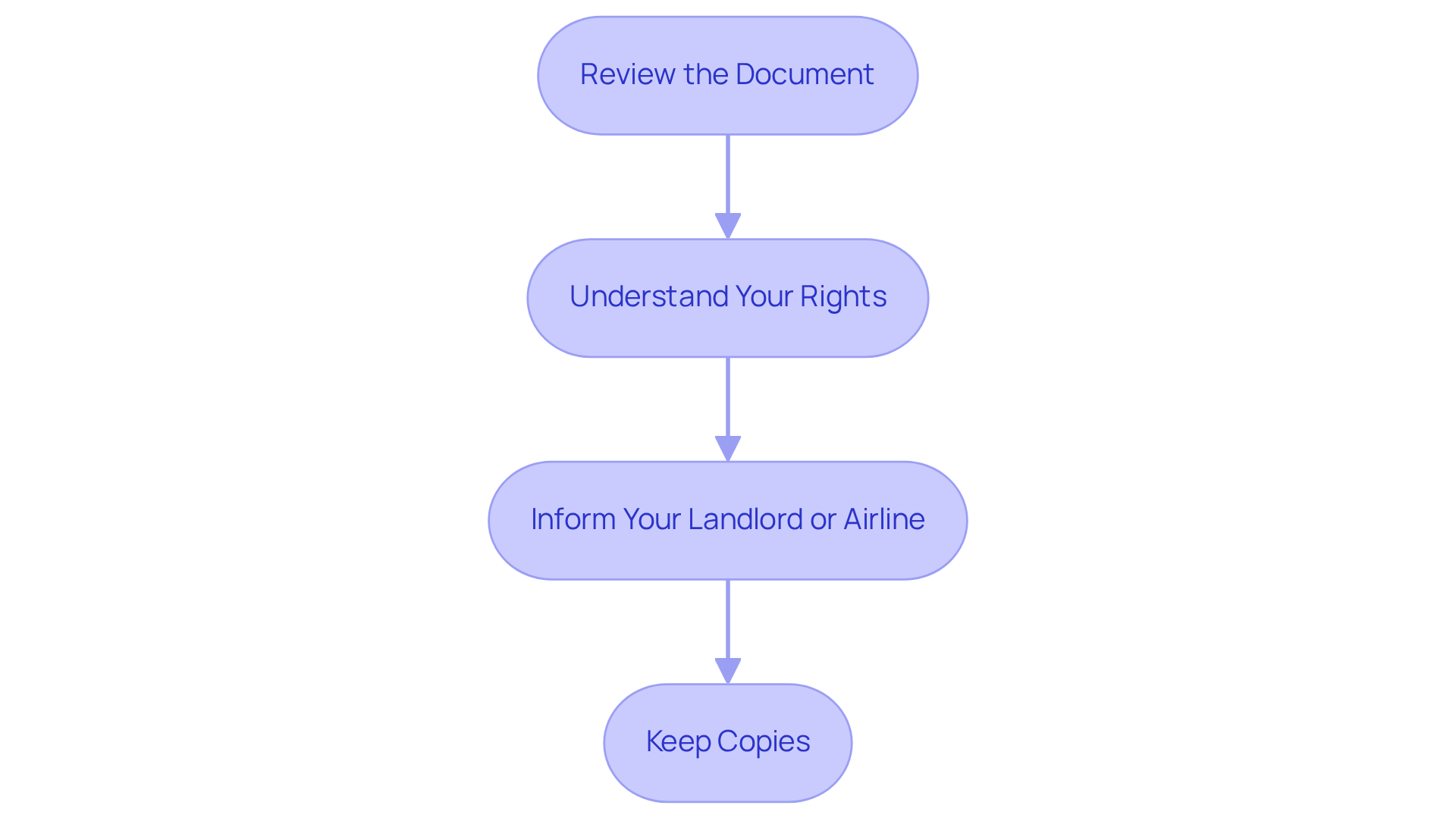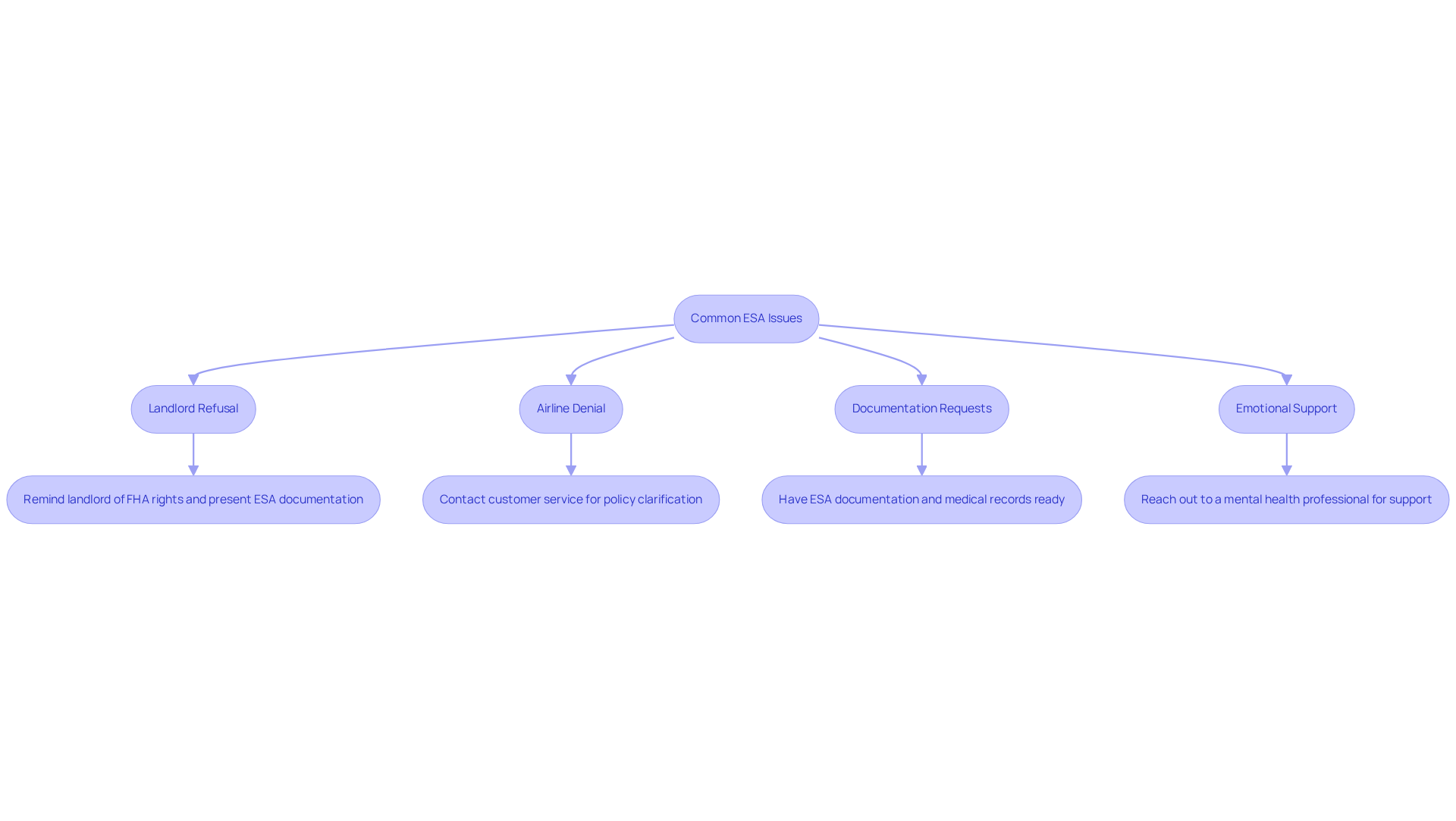

4 Steps to Obtain Your NYC Emotional Support Animal Letter
by Lena Park
Last updated: July 9, 2025
Verified and Approved by:
Angela Morris,
MSW, LCSW
Fact Checked

Overview
Navigating the journey to obtain your NYC emotional support animal letter can feel overwhelming, especially when you’re grappling with emotional challenges. It’s essential to first assess your eligibility by reflecting on your symptoms and consulting the relevant diagnostic criteria. Documenting your findings will empower you before you meet with a licensed medical professional.
This article outlines a compassionate process, highlighting the importance of honest communication with your healthcare providers. It also emphasizes understanding your rights under relevant laws. Together, these steps can help you acquire the necessary documentation for your emotional support animal, providing you with the comfort and companionship you deserve.
Introduction
Navigating the complexities of emotional support animals (ESAs) in New York City can feel overwhelming. Many individuals face emotional challenges such as anxiety, depression, or PTSD, and the thought of securing an ESA can stir up feelings of confusion and uncertainty. An ESA can offer vital companionship and comfort during these difficult times.
Yet, obtaining an official ESA letter often involves a complicated process that can leave individuals feeling lost. What steps must one take to ensure eligibility? How can individuals advocate for their rights once they have their documentation?
This guide seeks to illuminate the path to securing an ESA letter, empowering readers with the knowledge and confidence needed to navigate the system successfully. Remember, you are not alone in this journey, and support is available every step of the way.
Assess Your Eligibility for an Emotional Support Animal
Determining your suitability for an NYC emotional support animal begins with a compassionate assessment of your psychological state. Many individuals face emotional challenges such as anxiety, depression, PTSD, and other psychological disorders. Let’s explore a structured approach to help you understand your eligibility:
- Identify Symptoms: Take a moment to document any symptoms that disrupt your daily life, like persistent sadness, anxiety, or social withdrawal. It’s important to recognize that approximately 19.1% of adults in the U.S. have experienced an anxiety disorder in the past year, reflecting how common these struggles can be.
- Consult Diagnostic Criteria: Review the DSM-5 criteria for psychological disorders to see if your symptoms align with recognized conditions. Understanding these criteria can help clarify whether your experiences resonate with typical psychological concerns.
- Consider the Role of an ESA: Reflect on how an animal could provide comfort and alleviate your symptoms. For example, if anxiety is a challenge for you, think about how the presence of a pet might offer emotional stability. Research shows that individuals with PTSD, affecting about 3.6% of U.S. adults, often find significant relief through the companionship of an NYC emotional support animal.
- Document Your Findings: Keep a detailed record of your symptoms and their impact on your life. This documentation will be crucial when discussing your needs with a licensed medical professional, who will ultimately assess your eligibility for an ESA.
By following these steps, you can prepare for a consultation with a healthcare provider, presenting a clear picture of your psychological needs. Remember, the journey to obtaining an ESA document is not solely about meeting criteria; it’s about understanding how an animal can enhance your emotional well-being and support your healing journey.

Consult with a Licensed Medical Professional
After assessing your eligibility, the next step is to consult with a licensed medical professional through Wellness Wag’s streamlined telehealth services. This process can feel overwhelming, but we’re here to support you. Follow these steps to ensure you receive the care you deserve:
- First, find a qualified expert. Look for a licensed therapist, psychologist, or psychiatrist who specializes in psychological well-being. You can utilize online directories or seek referrals from trusted sources to find someone who understands your needs.
- Next, schedule an appointment. Reach out to Wellness Wag to arrange a personalized consultation with a licensed medical professional. It’s important to clearly communicate your intention to discuss obtaining an ESA letter. This step is crucial in ensuring that your specific needs are addressed.
- As you prepare for the consultation, gather records of your symptoms and any previous psychological assessments. Being ready to articulate how an ESA could support your emotional well-being will help your professional understand your situation better.
- During the appointment, candidly share your mental health challenges and the potential benefits of an ESA. Honesty and thoroughness in your responses are vital for building trust in the therapeutic relationship. Remember, this is a safe space for you to express your feelings.
- If the professional agrees that an ESA would be beneficial, don’t hesitate to formally request the ESA document. Wellness Wag guarantees that you will receive a professionally crafted ESA document with legal recognition within 24 hours of your consultation, complete with the necessary licensing information printed on official stationery.
- In New York City, the demand for certified psychological professionals is significant, as many individuals seeking an NYC emotional support animal rely on the assistance of over 198,811 available therapists. However, the average wait time for appointments can range from two to three weeks. This highlights the importance of scheduling your consultation promptly with Wellness Wag. Engaging with a qualified expert not only streamlines the documentation process for an NYC emotional support animal but also ensures that you receive the essential support for your mental health needs.
- Additionally, it’s crucial to understand that falsely claiming a pet as an ESA can lead to legal consequences, including fines in states with anti-misrepresentation laws. By comprehending your rights under the Fair Housing Act, you can feel empowered in your journey to acquire an ESA document. Remember, you are not alone in this process, and there is support available to guide you every step of the way.
Receive and Utilize Your Official ESA Letter
After your consultation, you will receive your official ESA document. Here’s how to make the most of it:
- First, take a moment to review the document. Confirm that it includes your name, the licensed professional’s details, and a clear statement affirming your need for an NYC emotional support animal. This documentation is not just a formality; it’s essential for asserting your rights under the Fair Housing Act (FHA) and the Air Carrier Access Act (ACAA).
- Next, it’s important to understand your rights. Familiarize yourself with the protections offered by the FHA, which prohibits discrimination against individuals with disabilities and their NYC emotional support animal in housing situations. Under the ACAA, you also have rights regarding travel accommodations with your NYC emotional support animal. However, it’s crucial to be aware that recent regulations have limited ESA access on commercial flights. Additionally, some states, like California and Montana, require a 30-day relationship with a healthcare provider before issuing an ESA document.
- When you’re ready, inform your landlord or airline. Present your ESA documentation when seeking accommodations. Be prepared to explain your rights under the FHA and ACAA, emphasizing that landlords cannot impose pet fees or deny your request unless deemed unreasonable. For instance, consider a tenant who successfully used their ESA documentation to secure housing despite initial resistance from their landlord, showcasing the importance of understanding and asserting your rights.
- Finally, remember to keep copies. Make several duplicates of your ESA document and store them securely. You may need to present it multiple times in various situations, such as when applying for housing or boarding a flight. Having these copies readily available ensures you are always prepared to advocate for your rights. It’s also worth noting that the average annual cost of maintaining an ESA can range from $800 to $2,000, so being aware of the financial implications is vital. Lastly, consider that Wellness Wag offers flexible payment plans starting as low as $32.25, making their services more accessible to you.

Troubleshoot Common Issues with Your ESA
Even after you have received your ESA documentation, challenges may still arise. Let’s explore how to compassionately troubleshoot some common issues:
- Landlord Refusal: If you find that your landlord is unwilling to accept your ESA, it’s important to remind them of your rights under the Fair Housing Act (FHA). Presenting a copy of your ESA document along with relevant legal information can be helpful. Emphasize that the FHA prohibits discrimination against individuals with disabilities and mandates reasonable accommodations for ESAs. Remember, landlords can face significant penalties for violating these rights, including civil damages and attorney fees.
- Airline Denial: Should an airline deny your ESA, reach out to their customer service to clarify their policies regarding emotional support animals. Be prepared to show your ESA document, which is the only valid paperwork needed for travel. It’s common for misunderstandings about ESA policies to occur, so clear communication is essential.
- Documentation Requests: Sometimes, landlords or airlines may request additional documentation to verify your ESA’s legitimacy. Ensure that you have your ESA documentation and any relevant medical records readily accessible. It’s important to understand that valid ESA letters must be issued by licensed healthcare professionals and should clearly state the necessity of the animal for your emotional support.
- Emotional Support: Navigating these challenges can indeed be stressful. If you find yourself experiencing anxiety or stress during this process, consider reaching out to a mental health professional for additional support. They can assist you in managing your emotions and reinforce the importance of your ESA in your life. Remember, maintaining a strong bond with your ESA can significantly alleviate feelings of loneliness and anxiety. Studies show that individuals with secure attachments to their pets report 25% lower anxiety levels.
By following these steps, you can compassionately address common issues related to your ESA and ensure that your rights are upheld.

Conclusion
Navigating the process of obtaining an emotional support animal (ESA) letter in New York City can feel overwhelming, especially for those facing emotional challenges. It’s important to acknowledge the struggles many individuals endure during difficult times. This guide has provided a clear, step-by-step approach to empower you, helping you assess your eligibility, consult with licensed professionals, and effectively utilize your ESA documentation.
Understanding your personal emotional challenges is crucial. The importance of professional consultations cannot be overstated, as they validate your needs and guide you through the process. It’s also essential to know your rights under the Fair Housing Act and the Air Carrier Access Act. Being informed about these rights can alleviate some of the stress associated with securing your ESA letter.
Additionally, addressing common issues, such as landlord refusals and airline denials, highlights the necessity of being prepared. It’s natural to feel anxious about these potential obstacles, but remember that you are not alone in this journey. Many have faced similar challenges and found ways to overcome them.
Ultimately, having an emotional support animal can significantly enhance your emotional well-being and provide relief from mental health struggles. By following the outlined steps and advocating for your rights, you can ensure you receive the support you deserve. The journey to securing an ESA letter may seem complex, but with the right resources and knowledge, you can navigate this process successfully. Embrace the companionship that an ESA can offer, and know that you are taking a vital step towards healing and comfort.
Frequently Asked Questions
What is the first step in assessing eligibility for an emotional support animal (ESA) in NYC?
The first step is to conduct a compassionate assessment of your psychological state, identifying any emotional challenges such as anxiety, depression, or PTSD.
How can I identify if I have symptoms that warrant an ESA?
You can identify symptoms by documenting any disruptions in your daily life, such as persistent sadness, anxiety, or social withdrawal.
What percentage of adults in the U.S. have experienced an anxiety disorder in the past year?
Approximately 19.1% of adults in the U.S. have experienced an anxiety disorder in the past year.
What should I do to understand if my symptoms align with recognized psychological conditions?
Review the DSM-5 criteria for psychological disorders to see if your symptoms match any recognized conditions.
How can an emotional support animal help alleviate my symptoms?
Reflect on how an animal could provide comfort and emotional stability, particularly if you struggle with anxiety or other emotional challenges.
What is the prevalence of PTSD among U.S. adults, and how can an ESA help?
About 3.6% of U.S. adults are affected by PTSD, and many find significant relief through the companionship of an emotional support animal.
Why is it important to document my symptoms and their impact on my life?
Documenting your symptoms is crucial for discussing your needs with a licensed medical professional, who will assess your eligibility for an ESA.
What should I do to prepare for a consultation with a healthcare provider regarding an ESA?
Prepare by keeping a detailed record of your symptoms and how they affect your life, presenting a clear picture of your psychological needs during the consultation.
Certify Your Emotional Support Animal Today

Why You Can Rely on Us?
At Wellness Wag, we believe your pet deserves care rooted in both science and compassion. Each article is carefully researched, written in clear language for pet owners, and then reviewed by qualified professionals to ensure the information is evidence-based, current, and practical for real-life care. Our goal is to help you feel confident in making informed decisions about your pet’s health and well-being.
Reviewed by
Angela Morris, MSW, LCSW
Angela is a licensed clinical social worker with 20 years of experience in patient advocacy and community mental health. She has assisted numerous clients with ESA evaluations and brings a deep understanding of disability accommodations, ensuring that all information is accurate, supportive, and practical.

Written by :
Lena Park
Last Updated :
July 9, 2025












